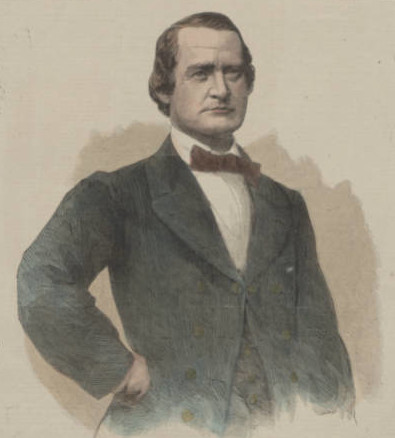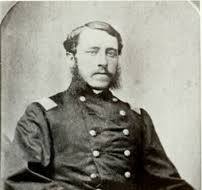 |
| Isaac W. Hayne of South Carolina. |
 |
| Lt. Norman Hall of the Fort Sumter garrison. |
|
The firing upon the Star of the West,
carrying reinforcements for Maj. Anderson's command, almost
precipitated wider hostilities. Anderson and Gov. Pickens
exchanged angry letters over the incident, and then two representatives
of South Carolina demanded that Anderson surrender Fort Sumter.
Anderson took the occasion of his reply to this demand to suggest that
he be allowed to send an officer to Washington for further
instructions, adding the suggestion that Gov. Pickens might send
someone to communicate directly with the Buchanan Administration about
the status of Fort Sumter. Anderson sent Lt. Norman Hall (who
would rise to the rank of colonel during the Civil War, helping to
repulse Pickett's Charge at Gettysburg); Gov. Pickens sent Isaac W.
Hayne, then serving as Attorney General of South Carolina.
|
|
|
State of South
Carolina, Executive Office, Charleston, January 11,
1861 To Major Anderson, Commanding Fort Sumter. Sir: I have thought
proper, under all the circumstances of the peculiar state of public affairs in
the country at present, to appoint the Hon. A. G. Magrath and General D. F.
Jamison, both members of the Executive Council and of the highest position in the
State, to present to you considerations of the gravest public character, and of
the deepest interest to all who deprecate the improper waste of life, to induce
the delivery of Fort Sumter to the constituted authorities of the State of
South Carolina, with a pledge on its part to account for such public property
as is under Your obedient
servant,
F. W. Pickens. Headquarters, Fort
Sumter, S. C., January 11, 1861. To His Excellency F. W. Pickens, Governor of South Carolina. Sir: I have the honor to
acknowledge the receipt of your demand for the surrender of this fort to the
authorities in South Carolina, and to say in reply that the demand is one with
which I cannot comply. Your Excellency knows that I have recently sent a
messenger to Washington, and that it will be impossible for me to receive an
answer to my despatch forwarded by him, at an earlier date than next Monday.
What the character of my instructions may be, I cannot foresee. Should your Excellency deem fit, prior to a resort to arms,
to refer this matter to Washington, it would afford me the sincerest pleasure
to depute one of my officers to accompany any messenger you may deem proper to
be the bearer of your demand. Hoping to
God that in this and all other matters in which the honor, welfare and life of
our fellow-countrymen are concerned, we shall so act as to meet His approval,
and deeply regretting that you have made a demand with which I cannot comply, I have the honor to be, with the highest regard, Your obedient
servant, Robert Anderson, Major U. S. Army,
Commanding. |
Back to Civil War Chronologies (Main page) Back to Chronology of the Fort Sumter Crisis Source: Crawford, Samuel, The Genesis of the Civil War: The Story of Sumter, Charles Webster & Co., 1887, pp. 192--94. Date added to website: January 8, 2025. |